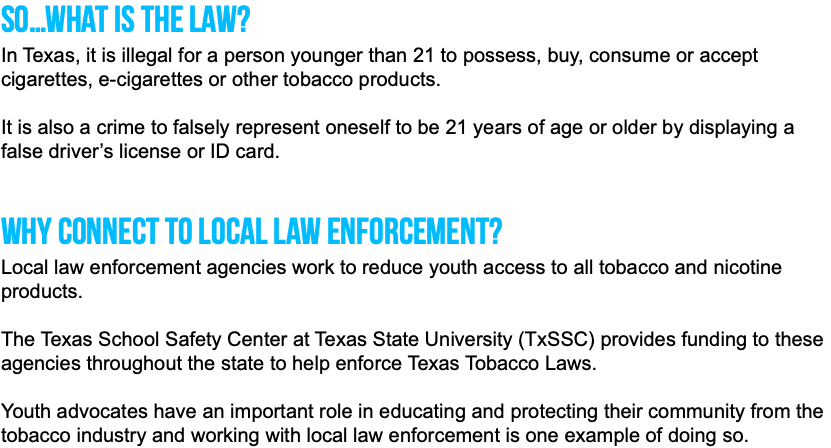
Module 3:
Enforcement & Prevention Programs
Never doubt that a small group of thoughtful, committed people can change the world. Indeed, it is the only thing that ever has.
– Margaret Mead
The information presented in Module 3 will discuss:

There are three types of law enforcement agencies in the United States – local, state, and federal.
• Local enforcement agencies include police and sheriff departments.
• State agencies include the state or highway patrol.
• Federal agencies include the FBI and the U.S. Secret Service.
In Texas, tobacco enforcement is conducted at both the local and state level.
Some local law enforcement agencies may include:
1. City Police Department
2. County Sheriff’s Office
3. Constable Precinct
4. Tribal Police Department
5. School District Police
State law enforcement of the Texas Tobacco Laws is enforced by the Texas Comptroller’s office. This office ensures tobacco retailers understand the importance of not selling tobacco to minors and provides the states’ warning signs and stickers to remind the public that Texas does not tolerate underage use, purchase, or possession of all tobacco and nicotine products.
Watch the video below to hear the history of tobacco enforcement in Texas and then read on to complete a quick activity to help you identify your local enforcement agency.

Youth groups and leaders have partnered with police departments, Sheriff’s Offices, school resource officers, and more to work together to educate and protect their peers from Big Tobacco.
Here are a few examples of how to partner with local law enforcement.
• Community Awareness Events
• Undercover Buys/Stings
• School Presentations
• School Resource Fairs
• Tobacco Prevention Awareness Days
• Red Ribbon Week

To begin the activity, download and print the Texas Tobacco Enforcement Worksheet. Using the worksheet, identify and write down the contact information of your local enforcement agency, community services contact, and school resource officer.
Once you complete the activity, contact the Tobacco Enforcement Program at TxSSC and see if your local law enforcement participates in conducting tobacco buys/stings. If they don’t, ask how you can help encourage your local law enforcement to participate in the program.
Tobacco Enforcement Program
Bea Pyle
(512) 245-0821
beapyle@txstate.edu
Then, contact the community relations person and school resource officer from your worksheet and ask how you can help create a partnership between your youth group and your local law enforcement agency.

The Texas youth movement was created to encourage Texans to live the tobacco-free life and consists of people like you. Champions who are youth and adult role models that are passionate about serving as leaders for their peers, family, and community members.
Watch the video below to see how the youth movement was formed and then read on to learn about the accomplishments youth and adults like you have made for our state and nation.
Say What! Teen Ambassadors (TA’s) and member groups have had a key role in educating their peers and community members about the dangers of tobacco and nicotine products and industry deception from Big Tobacco.
Take a look at the achievements the Texas youth movement has made since 2000:
Say What! Teen Ambassadors are created. The original 8 Ambassadors were selected to serve as the “youth voice” for all youth across the state for tobacco prevention and to provide guidance to the state.
TA’s begin helping Say What! staff to plan and staff Regional Summits and the statewide Conference.
TA’s presented at the National Conference on Tobacco or Health, in San Francisco, to represent Texas.
TA Ashley Shultz from Waller, TX received the Western Regional Youth Advocate of the Year by the Campaign for Tobacco-Free Kids. Ashley is the first TA to receive national recognition!
TA’s presented at the National Conference on Tobacco or Health, in Minnesota, to represent Texas.
Say What! Consultant Ambassadors began. The Consultant program consists of Texas college students who are dedicated to serving as a mentor to the Teen Ambassadors and continue educating their peers at the college level.
TA’s Jake Lira and Melvin Nelson were named Legacy Foundation Fellows, now known as Truth Initiative Fellow. Another national leadership role for Texas tobacco prevention.
TA’s attended the National Conference on Tobacco or Health in Kansas City. The Say What! movement and Teen Ambassadors were recognized at a youth celebration ceremony as part of the conference.
TA Darrien Skinner from Ingleside, TX received the Western Regional Youth Advocate of the Year by the Campaign for Tobacco-Free Kids. Another national leadership role for Texas tobacco prevention.
TA’s attended the Reduce Tobacco Use Conference in Virginia.
TA’s attended the Philip Morris International Shareholders Meeting in New York City with Campaign for Tobacco-Free Kids.
TA’s Alexus Galindo and Daisy Alvarado attended the Campaign for Tobacco-Free Kids Youth Advocacy Symposium in Washington, DC and met with Congressmen and Congresswomen.
TA Darrien Skinner was named Legacy Foundation/Truth Initiative Fellow. Another national leadership role for Texas tobacco prevention.
TA’s Alexus Galindo and Carlos Vela attended the Campaign for Tobacco-Free Kids Youth Advocacy Symposium in Washington, DC and met with Congressman and Congresswomen.
TA Carlos Vela from Ingleside, TX received the South Region Youth Advocate of the Year by the Campaign for Tobacco-Free Kids. Another national leadership role for Texas tobacco prevention.
Say What! redesigned the website and member portal to make it easier for members and member groups to communicate, network and benefit from each other.
TA Carlos Vela from Ingleside, TX received the National Youth Advocate of the Year by the Campaign for Tobacco-Free Kids. Another national leadership role for Texas tobacco prevention.
TA Carlos Vela served as a key player at the Texas Capitol to provide testimony about raising the minimum sale age to 21 years old.
Say What! members and member groups have reached over 900,000 Texans with tobacco prevention messages and activities.
TA’s Kellen Kruk and Carlos Vela attended the Campaign for Tobacco-Free Kids Youth Advocacy Symposium in Washington, DC and met with Congressman and Congresswomen.
TA Kellen Kruk from Lufkin, TX received the Regional Youth Advocate of the Year by the Campaign for Tobacco-Free Kids. Another national leadership role for Texas tobacco prevention.
Say What! member group VKOT (Vikings Kicking Out Tobacco) from Bryan High School in Bryan, TX received the Group Award for the Youth Advocate of the Year by the Campaign for Tobacco-Free Kids. This is the first Texas youth group to receive national recognition and serve as a national leader for Texas tobacco prevention.
Say What! member Alex Sanchez was named Legacy Foundation/Truth Initiative Fellow. The first member to receive national recognition and serve in a national leadership role.
Say What! member Alex Sanchez visited the White House and met with First Lady Melania Trump to discuss concerns about the youth e-cigarette and vaping epidemic.
TA Kellen Kruk served as a key player for testimony and advocacy at the Texas Capitol about raising the minimum tobacco sale age to 21 years old.
Say What! members and TA’s were selected to serve as Texas 21 Youth Ambassadors by the Campaign for Tobacco-Free Kids to advocate for increasing the sale age from 18 to 21 years old.
Say What! members served as the crucial player in the passage of Texas 21! The Texas youth movement was responsible for increasing the legal tobacco sale age from 18 to 21 years old.
Since 2000, Texas youth have shaped local and state tobacco policies, educated over
1 MILLION Texans, and have relentlessly inspired thousands to stand up, speak up, and be tobacco-free.
How will you make your place in Texas’ youth tobacco prevention history? Download the Texas Youth Movement worksheet to plan your legacy.
Don’t forget to take the quiz to receive your certificate of completion and any downloadable resources.
Training Module
Modules
Home
Say What! EST. 2011
Phone
512.245.8082
Mailing Address
Texas School Safety Center
ATTN: Say What Program
Texas State University
601 University Drive
San Marcos, TX 78666

Say What! was created and designed by young people from across Texas and connects students interested in eliminating tobacco from their schools and communities. The Say What! movement is funded by the Texas Department of State Health Services through a contract with the Texas School Safety Center at Texas State University.

